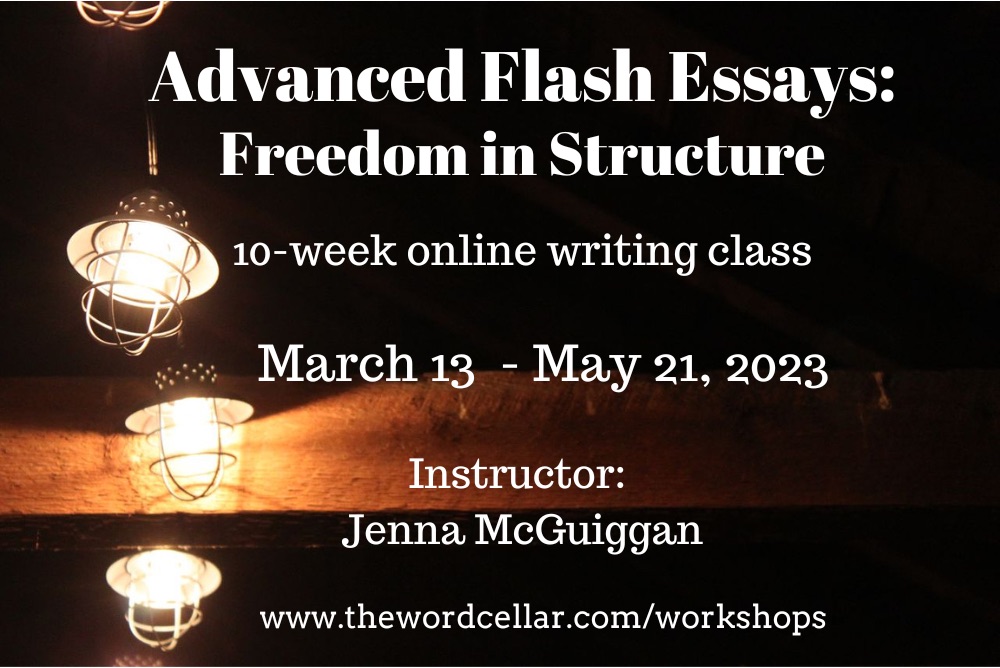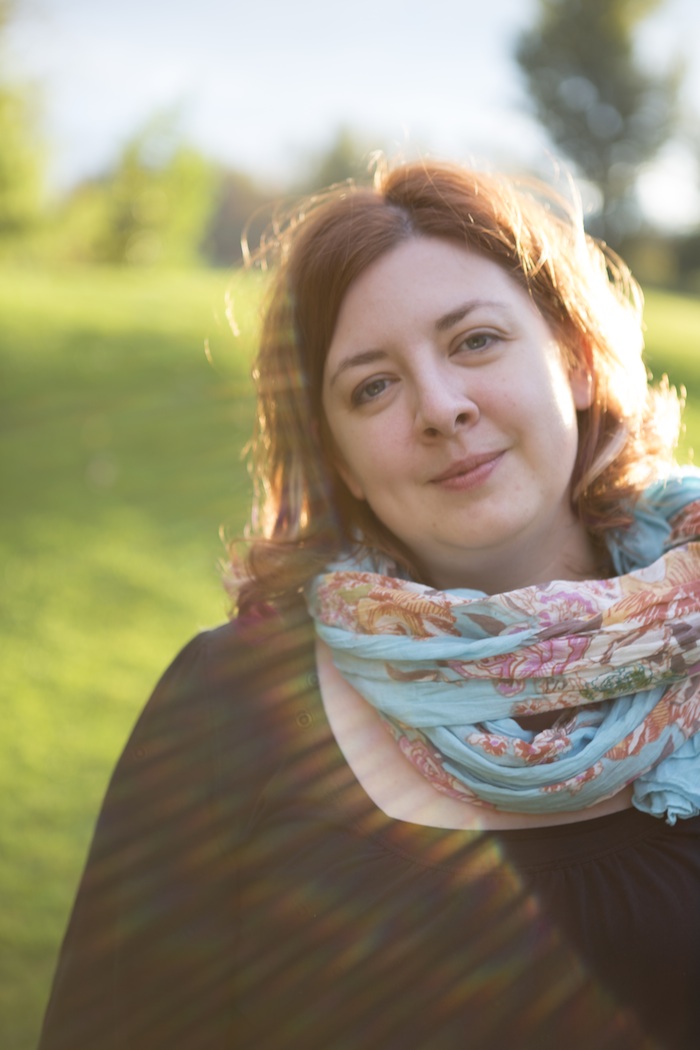Advanced Flash Essays: Freedom in Structure
Current Session: March 13 - May 21, 2023
Future dates TBA

Explore a range of short nonfiction forms, styles, and structures.
Sometimes it can be harder to write short than to write long, but the flash essay presents a fun and potentially immensely rewarding challenge. Paradoxically, the word-count limitations may offer writers a certain kind of liberty. As author Julia Cameron has written, “In limits there is freedom. Creativity thrives within structure.”
This class is designed for writers who are familiar with the basics of flash nonfiction and want to go deeper into the form. We’ll explore a range of short nonfiction forms, styles, and structures. We’ll focus on specific elements of the craft of writing and learn ways to use these elements within the confines of up to 1,000 words.
(This class builds on the concepts we explore in the 5-week Flash Essays Class, but that class is not a prerequisite for this one.)
Sign up for the mailing list to hear about future dates for this class.
OVERVIEW
This is an asynchronous class, which means you don't have to be online at any specific time (with the exception of one optional Zoom call). Each week of class includes written lectures, a selection of readings, and discussions of assigned readings and other general writing topics with peers and the instructor. Some weeks also include writing prompts and/or assignments and the opportunity to submit one or more flash essays for instructor and/or peer review.
Note: In order to receive instructor feedback on assignments, students must participate each week in class discussions. This also helps to create a robust community and rich classroom experience for everyone.
CURRICULUM
Week 1: Forms of Flash
“Why are miniature things so compelling?” asks author Lia Purpura. Why do we marvel at teacup pigs, bonsai trees, and the perfect paragraph? How can we squeeze the pulsating, swirling meaning of life into a page or two? This week, we’ll look at a variety of short nonfiction forms. We’ll examine why each is so compelling and how these forms are integral to creative nonfiction’s past, present, and future.
Week 2: Miniaturized Building Blocks
“The world is everywhere whispering essays,” wrote essayist Alexander Smith. If essays are the stuff of life, how do we stuff our lives into a short memoir or personal essay? This week we’ll explore the building blocks of narrative nonfiction and experiment with shrinking those blocks to fit into the tiny spaces of flash. Writing exercises will train our writers’ eyes to see with several dual perspectives: literal and figurative; past and present; big and small.
Week 3: Beginnings, Middles & Endings
Not all flash nonfiction has a clear narrative arc or plot, but all essays have some kind of beginning, middle, and end. This week we’ll look at techniques to write engaging openings, interesting middles, and powerful endings. Individual craft components will include rendering vivid characters and descriptive settings and identifying indispensable dialogue. We’ll also practice finding the best balance of showing and telling in short essays.
Week 4: Hone Your Work (Revision)
Just as there’s not a single way to write flash nonfiction, there’s not a single way to revise it. This week we’ll explore a variety of methods for revision and editing based on personal preference, creative aesthetic, thought patterns, and work habits. Students will also have the opportunity to create a personal writing manifesto focused on the concepts of vision and revision.
Week 5: Contours of Symbolism
“Tell the truth but tell it slant.” So go the oft-quoted words of wisdom from Emily Dickinson. The second line of that poem is quoted less often: “Success in Circuit lies.” This week, we’ll find ways to tell the truth by going the long way round … or is it the short way through? We’ll dive deep into using details, imagery, and metaphor to create texture and convey meaning.
Week 6: Structural Possibilities
Does form always follow function? Or, is it possible that an essay’s content and structure are one and the same? This week we’ll explore the wide range of structures that are possible in flash nonfiction, including narrative, lyric, chronological, fragmented, micro, and more.
Week 7: Personal-Universal Bridge
Our stories, experiences, observations, and thoughts should transcend the personal. This week we’ll learn about constructing a bridge from the personal to the universal. We’ll look at how elements such as specificity and external research can contribute to deeper, more resonant essays.
Week 8: Poetics of Prose
“When I experience anything,” wrote poet Dylan Thomas, “I experience it as a thing and a word at the same time, both equally amazing.” Why should poets have all the fun? After all, flash nonfiction often occupies the space between prose and poetry. This week we’ll explore how both the mechanics and aesthetics of language can enhance our work.
Week 9: Shape Your Voice
Great singers have stage presence. Great writers have page presence. Voice is always important in creative nonfiction, but it’s exponentially more important (and noticeable) in short forms. In flash, the writer’s voice has the potential to carry an even heavier load than normal; it can compel readers to keep reading—and to share the writer’s vision. We’ll play with our own writing voices (yes, we each have more than one) to discover how voice can create something substantial out of thin air.
Week 10: Home Your Work (Publishing)
This week we’ll discuss finding a “home” for your work out in the world. We’ll cover the ins and outs of submitting to literary magazines and how to decide where to submit. Students will have the opportunity to identify potential outlets for their own work as well as that of their classmates.
TECHNICAL INFO
Format: Each week's materials will be posted at the beginning of the week and will remain available for the duration of the class. This is an asynchronous class, which means students can access the materials at their convenience. This is an asynchronous class, which means you won't need to be online at any specific time (with the exception of an optional Zoom call).
Platform: The class is housed on Wet Ink, an online learning platform designed for writing classes.
Archive: At the close of class, students will receive a zip file with all class materials, along with a copy of any assignments they submitted and feedback they received.
Questions about the class or how it works?
Email Jenna McGuiggan: jennifer@thewordcellar.com
REGISTRATION
Sign up for the mailing list to hear about future dates for this class.
INSTRUCTOR: JENNA MCGUIGGAN
Formal Bio:
Jennifer (Jenna) McGuiggan wrote Mister Rogers' Neighbothood: Pieces of Wisdom Jigsaw Puzzle Book (Thunder Bay Press, 2021) and co-authored Mister Rogers’ Neighborhood: A Visual History (Clarkson Potter, 2019). Her essays have been anthologized in Getting to the Truth: The Craft and Practice of Creative Nonfiction (Books by Hippocampus, 2021) and The Orison Anthology (vol. 4, 2019).
Her essays have appeared in The Rappahannock Review, Essay Daily, Flycatcher, New World Writing, online for Prairie Schooner and Brevity, and elsewhere. Her work has been nominated for the Best of the Net Anthology and chosen as a finalist in contests from Prime Number Magazine, Hunger Mountain, and the Orison Anthology.
Jenna received her MFA from Vermont College of Fine Arts. She has been teaching writing online and in-person since 2010. She is currently writing a book of linked essays that explore longing and belonging, from where we live to what we believe.
Informal Bio:
Hello! I'm Jenna McGuiggan, owner of The Word Cellar. I've worked as a professional freelance writer, editor, and creative coach since 2003. I've been teaching online writing classes since 2010. During that time, I've worked with hundreds of students and writers through my classes, coaching sessions, and editorial feedback services. I've taught for organizations such as the Creative Nonfiction Foundation, The Writer's Center, the HippoCamp writing conference, and the Barrelhouse Conversations & Connections conference.
I created this Flash Essays class in 2016 and have taught it more than 40 times through the Creative Nonfiction Foundation. I'm pleased to now bring it to you directly.
I received my MFA in Writing (creative nonfiction) from Vermont College of Fine Arts, and I hold a BA in English. (Learn more about my credentials here.)
My essays and articles have been published in a wide variety of print and online publications. (Learn more about my writing here.)
My teaching philosophy: I think of myself less as a teacher and more as a sharer: one who shares. I've learned a lot about writing and living the writing life through my experience and education. I love to share that with others.
I believe in art for art's sake, in the necessity of beauty, in the power of words, and in the karma of kindness.


